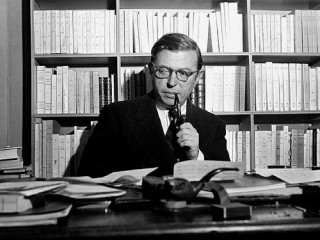
Jean-Paul Sartre (En.) biography
Date of birth : 1905-06-21
Date of death : 1980-04-15
Birthplace : Paris, France
Nationality : French
Category : Science and Technology
Last modified : 2011-07-21
Credited as : Philosopher, ,
Jean-Paul Sartre was born in Paris on June 21, 1905. His father, a naval officer, died while on a tour of duty in Indochina before Sartre was two years old. His mother belonged to the Alsatian Schweitzer family and was a first cousin to Albert Schweitzer. The young widow returned to her parents' house, where she and her son were treated as "the children." In the first volume of his autobiography, The Words (1964), Sartre describes his unnatural childhood as a spoiled and precocious boy. Lacking any companions his own age, the child found "friends" exclusively in books. Reading and writing thus became his twin passions. "It was in books that I encountered the universe."
Sartre entered the école Normale Supérieure in 1924 and after one failure received first place in the agrégation of philosophy in 1929. The novelist Simone de Beauvoir finished second that year, and the two formed an intimate bond that endured thereafter. After completing compulsory military service, Sartre took a teaching job at a lycée in Le Havre. There he wrote his first novel, Nausea (1938), which some critics have called the century's most influential French novel.
From 1933 to 1935 Sartre was a research student at the Institut Français in Berlin and in Freiburg. He discovered the works of Edmund Husserl and Martin Heidegger and began to philosophize in the phenomenological vein. A series of works on the modalities of consciousness poured from Sartre's pen: two works on imagination, one on self-consciousness, and one on emotions. He also produced a first-rate volume of short stories, The Wall (1939).
Sartre returned to Paris to teach in a lycée and to continue his writing, but World War II intervened. Called up by the army, he served briefly on the Eastern front and was taken prisoner. After nine months he secured his release and returned to teaching in Paris, where he became active in the Resistance. During this period he wrote his first major work in philosophy, Being and Nothingness: An Essay in Phenomenological Ontology (1943).
After the war Sartre abandoned teaching, determined to support himself by writing. He was also determined that his writing and thinking should be engagé. Intellectuals, he
thought, must take a public stand on every great question of their day. He thus became fundamentally a moralist, both in his philosophical and literary works.
Sartre had turned to playwriting and eventually produced a series of theatrical successes which are essentially dramatizations of ideas, although they contain some finely drawn characters and lively plots. The first two, The Flies and No Exit, were produced in occupied Paris. They were followed by Dirty Hands (1948), usually called his best play; The Devil and the Good Lord (1957), a blasphemous, anti-Christian tirade; and The Prisoners of Altona (1960), which combined convincing character portrayal with telling social criticism. Sartre also wrote a number of comedies: The Respectful Prostitute (1946), Kean (1954), and Nekrassov (1956), which the critic Henry Peyre claimed "reveals him as the best comic talent of our times."
During this same period Sartre also wrote a three-volume novel, The Roads to Freedom (1945-1949); a treatise on committed literature; lengthy studies of Charles Baudelaire and Jean Genet; and a prodigious number of reviews and criticisms. He also edited Les Temps modernes.
Though never a member of the Communist party, Sartre usually sympathized with the political views of the far left. Whatever the political issue, he was quick to publish his opinions, often combining them with public acts of protest.
In 1960 Sartre returned to philosophy, publishing the first volume of his Critique of Dialectical Reason. It represented essentially a modification of his existentialism by Marxist ideas. The drift of Sartre's earlier work was toward a
sense of the futility of life. In Being and Nothingness he declared man to be "a useless passion," condemned to exercise a meaningless freedom. But after World War II his new interest in social and political questions and his rapprochement with Marxist thought led him to more optimistic and activist views.
Sartre has always been a controversial yet respected individual. In 1964, Sartre was awarded but refused to accept the Nobel prize in Literature. Sartre suffered from detrimental health throughout the 1970s. He died of a lung ailment in 1980.
















